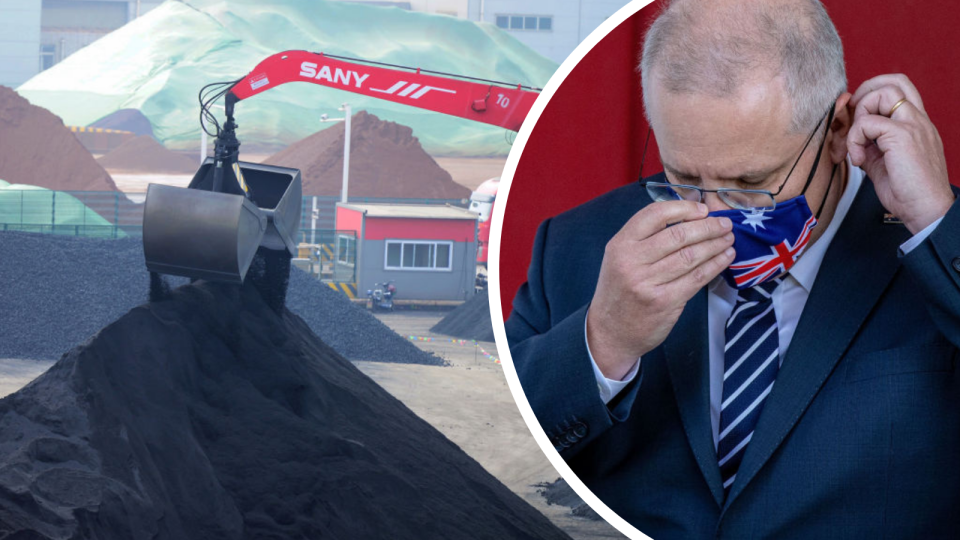What would happen if China stopped buying Australian iron ore?

Despite the Australia-China ties being at an all-time low, our monthly exports to China have hit a four-year high.
Much of this is being driven by Chinese demand for Australian iron ore, which in the 2019 financial year represented a $102 billion contribution to the national economy.
China is, by far, our biggest trade partner. China bought 66 million tonnes of imports from Australia in November, which is about the same as what they bought in October. In fact, since March, it’s bought more than 60 million tonnes of Aussie goods.
But this fact stands in stark contrast to the very public trade dispute between the two nations that is currently being hosted by the media.
Also read: Chinese official says Morrison overreacted to ‘repugnant’ social media post
Also read: ‘Stop wasting time’: China issues ‘serious’ warning amid further trade sanctions
If the relationship deteriorates further, which looks likely, could we lose our biggest customer?
According to AMP Capital chief economist Shane Oliver, it’s possible.
“If the trade spat continues to worsen, yes they may turn increasingly to other suppliers,” he told Yahoo Finance.
But there are two reasons they haven’t done that yet.
“First, it would mean too big a disruption to the Chinese economy.” Iron ore imports from Australia are worth $85 billion annually, and so far, the agricultural imports hit by China’s tariffs and bans are worth just $6 billion, he said.
“China would not be able to make up its iron ore needs from other sources.”
Heng Wang, a professor and co-director at UNSW Law’s CIBEL Centre, which researches Australia and China’s international trade and economic law relationship, told Yahoo Finance that it would be difficult for China to find a substitute for Australia’s iron ore which the Asian superpower is so “heavily reliant” on.
“China is reportedly importing 72 per cent of iron ore for its steel industry. Moreover, iron ore is crucial for [the] steel industry that greatly supports economic recovery and development in the context of Covid-19 outbreak,” he said.
“There is the impetus to continue existing trading patterns given the large amount of iron ore imports from Australia.”
Changing suppliers could be more trouble than it’s worth, Wang indicated, and might involve sorting out “many issues” like contracts, pricing and technical standards.
“It is a time-consuming and complex process.”
On top of this, Oliver said that Beijing might feel their trade bans and tariffs were “proportional” to its gripes with Canberra.
“Hence the targeting of relatively smaller exports, like alcoholic beverages which are around $1 billion per annum,” he said.
Could China get its iron ore from anywhere else?
The short answer is: yes, but it’s not as good. Brazil, in particular, is a major exporter of iron ore, but they are battling the pandemic, too, said Wang.
“The production in Brazil has also been affected by other factors like tailings dam collapse and heavy rain,” he said.
“Also, it is not always easy to find high-quality iron ore. China is exploring other iron ore markets like Africa but it will take time.”
But UNSW Professor of Practice in Economics Tim Harcourt doesn’t think it’s likely that China will turn to other countries for this commodity – it’s just politics.
“They are just trying to pick on Aussie small business and farmers to create political tension for the Coalition,” Harcourt told Yahoo Finance.
Besides, China is focused on growing its middle class to turn its nation of ‘shippers’ into a nation of ‘shoppers’, he added.
“Whilst the Chinese middle class are prosperous they won’t cause trouble for the Chinese Communist Party.”
What kind of economic hit would Australia cop?
Oliver estimates that the worst-case scenario would see Australia bruised by a 6 per cent hit to Australia’s GDP, or around $83.5 million.
“So far the impact is minor at a macro economic level as affected exports are around 0.3 per cent of GDP. But if bulk commodity exports including iron ore are disrupted then it would amount to 6 per cent of GDP,” he said.
“If this occurs gradually over time then Australia could adjust and find other markets. But if it occurs abruptly it would have a much bigger impact. But I agree with the Treasurer; the trade spat won’t stop the recovery in Australia which is being driven by a reopening of domestic economic activity.
“It’s more of a threat to longer term economic growth.”
Meanwhile, Harcourt simply doesn’t think it’s a possibility.
“It won’t happen.”
–with Reuters
jessica.yun@yahoofinance.com
Want to hear Australian influencers reveal their best finance tips? Join the Broke Millennials Club on Facebook, and receive one hot tip per day in December.
And if you want 2021 to be your best (financial) year yet, follow Yahoo Finance on Facebook, LinkedIn, Instagram and Twitter. Subscribe to the free Fully Briefed daily newsletter here.

 Yahoo Finance
Yahoo Finance 
